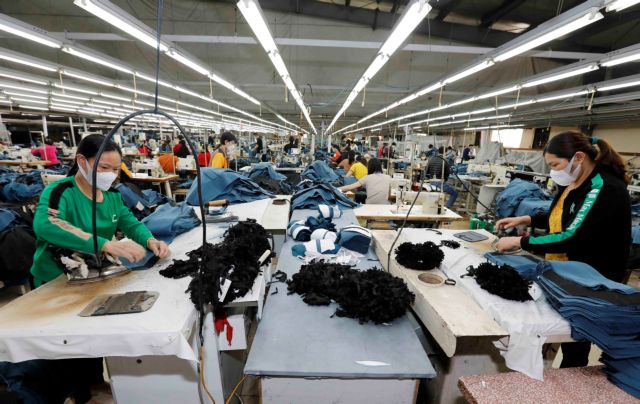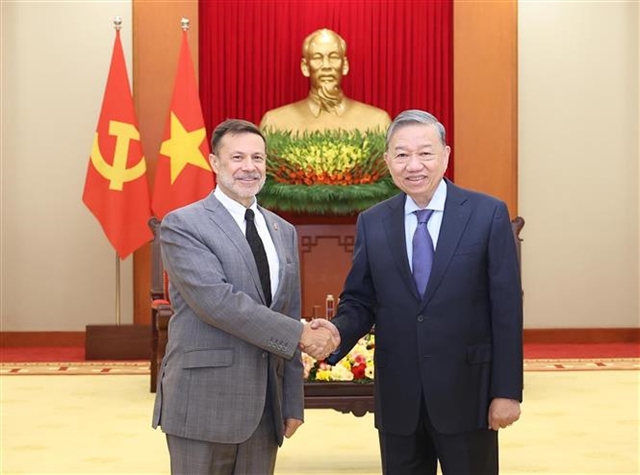 Economy
Economy

 |
| Zac Leon, director of Viet Product Source. — Photo courtesy of Zac Leon |
The United Kingdom-Việt Nam Free Trade Agreement (UKVFTA), effective since 2021, reduces or eliminate tariffs on many product groups, helping strengthen bilateral trade, which in turn is making Việt Nam an increasingly attractive business partner for UK firms.
Zac Leon is the director of Viet Product Source, a sourcing company that brings together foreign businesses and quality Vietnamese manufacturers.
He has over 15 years of experience working in Việt Nam besides long experience in supply chain, quality control and product management.
Leon speaks with Việt Nam News about Việt Nam’s manufacturing prowess and how the UKVFTA is facilitating co-operation between businesses in the two countries.
From your observation as a sourcing company, how has the UKVFTA impacted trade between Việt Nam and the UK?
The UKVFTA has significantly boosted trade between the two countries, particularly in sectors like textiles, footwear, electronics, and agricultural products.
UK exports to Việt Nam have seen growth, especially of machinery, pharmaceuticals and tech products, while Vietnamese exports to the UK, such as wooden furniture, seafood, coffee, and apparel, have also benefited from reduced tariffs.
I think the agreement has created a more transparent environment for both markets, offering better protection for intellectual property and reducing non-tariff barriers, which have been key to facilitating smoother trade.
How do you assess Việt Nam’s capabilities in production and working with foreign partners?
Việt Nam has become a global manufacturing hub, with strong capabilities in several sectors. The country has a skilled and competitive labour force and well-established infrastructure. These factors make Việt Nam an attractive partner for foreign businesses looking to source products.
As a sourcing company, I would say that Việt Nam’s commitment to quality, rapid delivery timelines and ability to adapt to international standards make working with Vietnamese suppliers quite beneficial. The ability to scale production quickly, coupled with the government’s pro-business reforms, has made operations smoother.
The UKVFTA has enhanced this by simplifying the regulatory environment, providing more certainty and stability for foreign companies looking to expand their operations to Việt Nam.
What are most UK businesses looking for in Vietnamese suppliers?
UK businesses typically look for Vietnamese suppliers who can provide high-quality products at competitive prices. Common product groups include textiles and apparel, seafood, coffee and other agricultural products, furniture, and electronics.
UK businesses look for several main criteria. The first is certification: suppliers are often required to have certification such as ISO 9001 (quality management), ISO 14001 (environmental management) and HACCP (food safety). For certain industries, certification like Fair Trade or organic may be important.
Then there is compliance with international standards such as CE marking for products exported to the EU, which is crucial, especially for sectors like electronics and machinery.
UK companies are also increasingly looking for suppliers with strong sustainability practices and ethical labour standards to ensure social and environmental responsibility.
Traceability is an important factor as well. Particularly in sectors like food and beverage, having clear supply chain traceability and adherence to food safety standards is highly valued.
 |
| The UKVFTA is contributing towards making Việt Nam a more attractive business partner to UK businesses. — VNA/VNS Photo |
Have Vietnamese companies working with Viet Product Source increased trade with the UK? Did the UKVFTA make it easier for Viet Product Source to connect UK and Vietnamese businesses?
Since the UKVFTA came into effect, many Vietnamese companies have seen increased opportunities in the UK market.
For instance, a Vietnamese furniture supplier partnering with Viet Product Source reported a 30 per cent year-on-year increase in UK orders between 2023 to 2024. This was largely due to reduced tariffs under the FTA, which made the products more competitively priced in the UK market.
Besides, the agreement’s provisions on trade facilitation, such as the recognition of customs procedures and intellectual property protections, have helped smooth the process of connecting suppliers and buyers in the two countries.
The UKVFTA has certainly made it easier for sourcing companies like Viet Product Source to bridge the gap between UK businesses and Vietnamese suppliers. The rise in UK companies looking to work with Việt Nam has been noticeable, especially in sectors Việt Nam excels in.
There is also a growing awareness in Việt Nam of the UK market’s demands, which has led to better-prepared and more competitive offerings.
Are there more UK businesses looking to invest in Việt Nam? Can you share some insights about this?
The UKVFTA has opened up new avenues for investment, with both countries keen to strengthen their economic ties.
Since its implementation, there has been an uptick in UK companies considering Việt Nam as a key investment destination, particularly in sectors such as renewable energy, infrastructure, manufacturing, and technology.
One notable example is UK-based renewable energy companies that are exploring partnerships with Vietnamese companies to develop wind and solar power projects.
The agreement’s emphasis on protecting foreign investments, reducing barriers to market entry and enhancing intellectual property protection has made Việt Nam a more attractive investment destination.
An anecdote worth mentioning is the case of a UK-based logistics firm that recently decided to establish a regional distribution hub in Việt Nam, thanks to the favourable conditions under the UKVFTA. This move not only strengthens bilateral trade but also facilitates easier access to the ASEAN market.
Do you have any advice for Vietnamese and UK businesses for working together and making use of the UKVFTA?
Vietnamese businesses need to focus on understanding the specific needs and preferences of UK consumers. This includes market research and ensuring products meet UK quality standards and certifications.
Working with UK trade advisors and customs experts can help maximise benefits, especially around tariff reductions.
Vietnamese companies should focus on building long-term, transparent relationships with UK partners, and they should also ensure compliance with UK regulatory standards, especially in terms of labour rights, environmental standards and product safety.
As for UK businesses, they should keep in mind that Việt Nam offers a wide variety of products, from textiles to electronics to agricultural goods. They can look beyond traditional sectors and explore new opportunities for collaboration.
Understanding the cultural nuances of working with Vietnamese partners can go a long way in building trust and effective communication.
Additionally, utilising local expertise can be a big help. Local sourcing agencies like Viet Product Source can help businesses navigate the Vietnamese market, handle logistics and ensure quality control. — VNS









